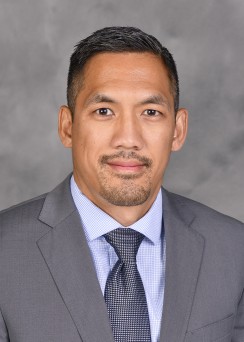Working to help transplant patients, Upstate researcher awarded millions to help create treatment to fight HCMV infection
Gary Chan, PhD was awarded more than $3 million over five years from the National Institute of Allergies and Infectious Diseases to work to find a treatment for one of the most dangerous infections for transplant recipients. Chan is an associate professor of microbiology and immunology at SUNY Upstate Medical University, whose lab is focused on studying host-pathogen interactions involving human cytomegalovirus (HCMV) and understanding how HCMV-mediated alterations to cellular function leads to human disease.

Gary Chan, PhD received $3.2 mil over five years from the NIAID to study HCMV and work to find a treatment.
HCMV is endemic and infects the majority of people in the world; up to 80% of the population by some reports. Typically, a healthy person isn’t aware of the infection, but HCMV can cause severe and sometimes fatal disease in immunocompromised individuals and newborns. This can be especially dangerous for people needing an organ transplant.
“HCMV is the most common opportunistic viral pathogen in transplant recipients leading to significant disease in these patients,” explains Chan. “Yet, there are very few approved antiviral drugs against HCMV, which have severe side effects.” HCMV can significantly raise the chance of organ rejection, making its treatment crucial for those needing a life-saving transplant.
Current anti-viral treatments delay replication but don't eliminate the infected cells. Chan is proposing to target heat shock factor (HSF) 1, a protein that is stimulated by HCMV, which could both inhibit the replication of HCMV and eliminate infected cells.
Chan thinks this approach could prove to be the key to a safer and more effective treatment. “Since HSF1 is a cellular protein needed by the virus to replicate, resistance against HSF1 inhibitors is unlikely. Also, because HSF1 is only activated in stressed cells such as virally infected cells, the side effects of HSF1 inhibition are likely to be mild.”
You can read more about Chan’s lab and their work studying HCMV here.